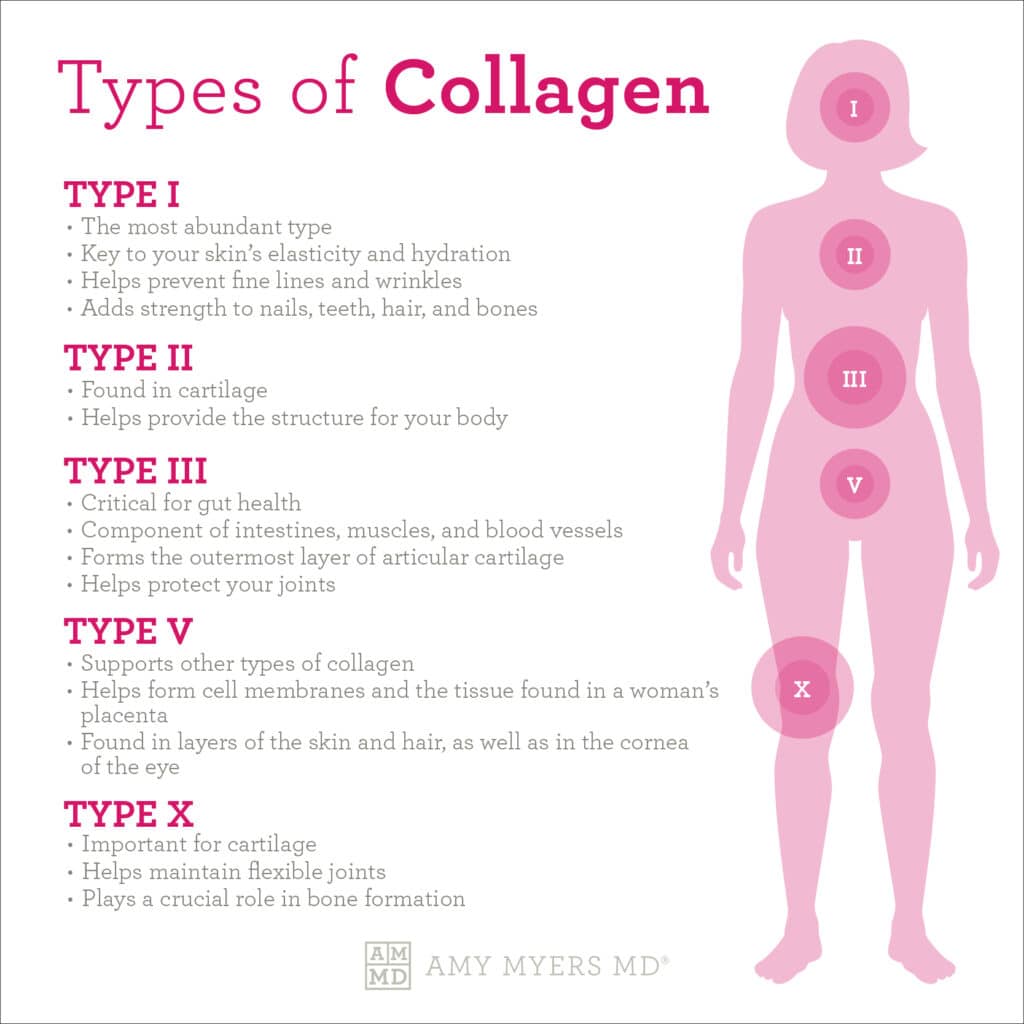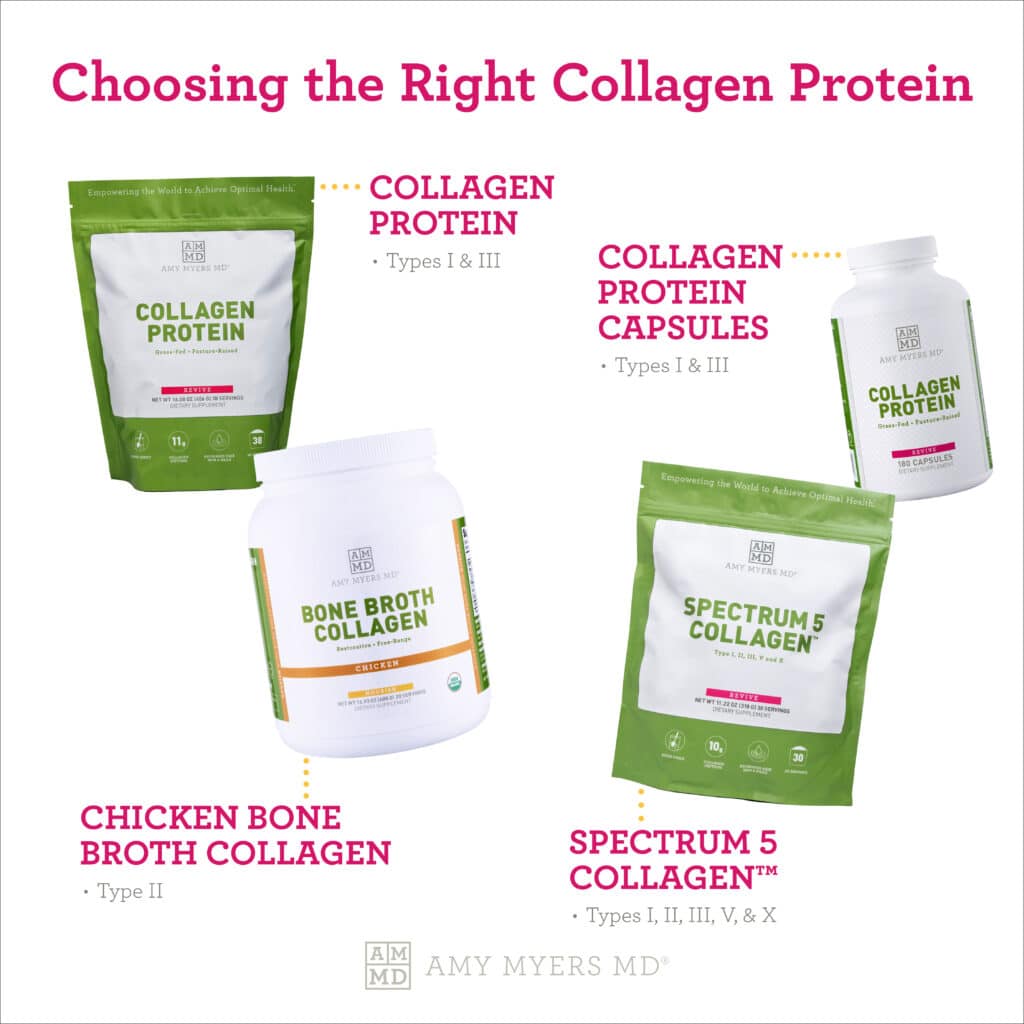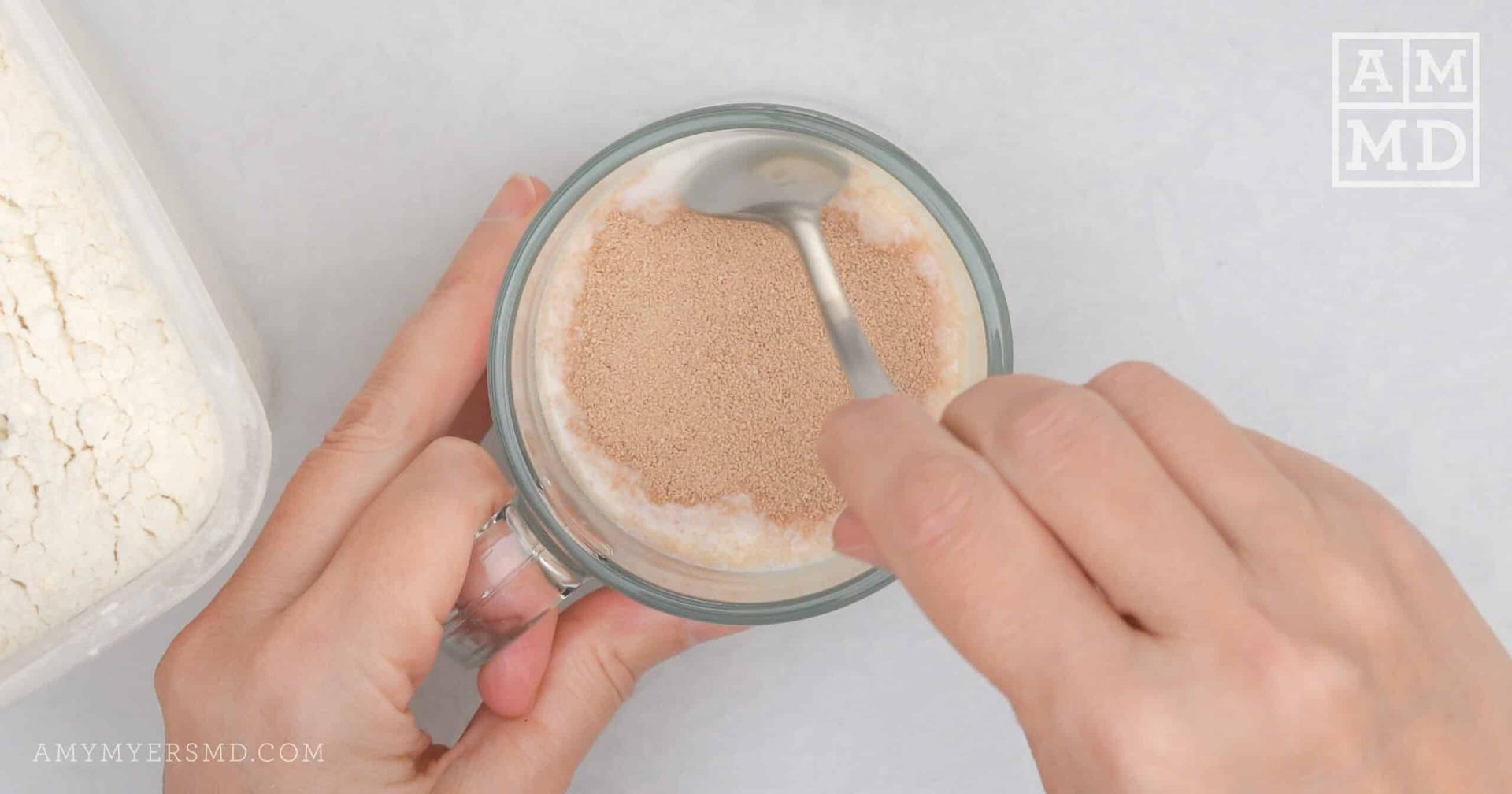If you’ve been to a big box retailer recently, you may have seen an overwhelming variety of collagen to choose from—yet not all collagen is created equal. Companies often cut corners and pair poorly-sourced collagen with artificial sweeteners, chemicals, or worse. I found it difficult to recommend a specific collagen powder that would fit my patients’ needs and support their unique situations. This led me to formulate my own collagen collection including products that are all-natural, non-GMO, and third-party tested to ensure the highest quality standards.
In this article, you’ll learn about the five main types of collagen and how to choose one that’s right for you. First, let’s dive a bit deeper to learn what collagen is composed of and why it’s so essential for whole-body health and vitality.
What Exactly is Collagen?
Collagen is an abundant protein found all throughout the body. It gets its name from the Greek word “kolla,” which means glue. I often refer to collagen as the “glue” that binds the rest of your body together.
Moreover, collagen isn’t one single protein—it’s a group of proteins composed of amino acids such as glycerine, proline, hydroxyproline, and arginine.1
These protein groups serve as the building blocks that form our tendons and ligaments—important tissues that keep joints stable, providing them with dexterity and flexibility. Collagen is present within your blood vessels, muscles, intervertebral discs, eye cornea, and even in your gastrointestinal tract and intestinal walls.2
- As we age, our natural collagen levels synthesize poorly and begin to decline and break down at an increasing rate.
- External or lifestyle factors such as sun exposure, toxins, tobacco use, genetics, and nutritional deficiencies all impact collagen levels.
- Collagen production starts to slow around age 35, and by age 40, your collagen levels break down faster than your body can replenish them.
- By age 60, over half of your body’s collagen has been depleted.3
Furthermore, your intestinal wall is made up of microscopic folds or “villi,” which you build from collagen.4 I’ve seen patients whose collagen levels were so low that they developed a leaky gut. With a leaky gut, toxins, food particles, and infections easily permeate the intestinal wall and enter your bloodstream, where they can cause chronic inflammation—eventually leading to autoimmunity.
If you’re currently experiencing chronic inflammation, you’re not alone, and fortunately there’s something you can do about it. Lifestyle choices, dietary adjustments, and collagen supplementation can restore healthy collagen levels to help you ease the negative effects of a collagen deficiency.
Now let’s discuss five types of collagen to help you in choosing a collagen powder that suits your lifestyle.
5 Types of Collagen

The collagen in your body is a complex protein that can be arranged into different types. Identifying these types is a crucial part of choosing the collagen supplement best for you. Did you know that there are over 28 types of collagen?5 The following five types are most common…
- Type I Collagen is your body’s most abundant form, accounting for 90% of your total collagen. Type I resides in the dermis, the layer of skin just beneath the surface. It provides structure and support to your skin, joints, cartilage, and teeth. Type 1 collagen also supports healthy hair, skin, and nails.
- Type II Collagen supports joints and bones by promoting a healthy inflammatory response and helping your body maintain flexibility and dexterity. Type II collagen also contains chondroitin and glucosamine, which are known to assist in the rebuilding of joint cartilage.
- Type III Collagen is the second most common form of collagen. Type III collagen works together with Type I to support your gut, muscles, blood vessels, and, in women, the uterus. Type III collagen’s relationship to major organ systems can play a role in helping reduce the risk of diseases associated with inflammation.
- Type V Collagen is involved in cell membrane formation and tissue development in a woman’s placenta. It’s also present in the skin, hair, and the cornea of the eyes.
- Type X Collagen, also known as “the network-forming collagen,” plays a critical role in bone formation and is found within joint cartilage.
As you can see, each type of collagen has a distinct function. All 5 combined can offer your body an amazing set of benefits. I’ve found that supplementing with a diverse blend of collagen may be most beneficial for your quality of life—especially as you age.
How To Choose the Right Collagen Protein
When choosing a collagen protein, I recommend selecting one sourced from high-quality, organic, and sustainable origins. Collagen from grass-fed cows, wild-caught seafood, and free-range poultry provides superior natural profiles. Cleanly-sourced collagen will also minimize your body’s potential exposure to harmful substances or toxins.
When selecting a collagen powder, always look for one that is hydrolyzed—this means that it is more bioavailable, or easily absorbed and incorporated into the body.

Collagen Protein
The Myers Way® Collagen Protein is sourced from grass-fed, pasture-raised beef that is 100% non-GMO and always third-party tested. I ensured that my collagen contains essential amino acids like glycine to promote a healthy mood, restful sleep, healthy weight management, and to curb sugar cravings.
Collagen Protein contains a clean and high-quality source of hydrolyzed Type I and Type III collagen as well. As we learned earlier, Type I collagen provides structural support to skin, bones, teeth, and joints, while Type III supports a healthy gut lining, muscles, blood vessels, and vital organs.
My favorite part? It’s tasteless! Collagen Protein can be easily mixed into hot or cold beverages, making it a convenient addition to your daily routine—morning or night. For a refreshing mocktail, give my Ginger-Mint Mocktail recipe a try!
Chicken Bone Broth Collagen Protein
You can ensure that you maintain a healthy gut lining by incorporating collagen-rich foods and supplements into your diet, including bone broth and hydrolyzed collagen powder. Bone broth is a fantastic source of collagen, providing support for gut repair and a healthy inflammatory response. Pasture-raised and grass-fed animal bones and joints have been found to be a rich source of amino acids, collagen, and gelatin, all of which support healthy bones, joints, and skin.
My Chicken Bone Broth Collagen Protein is made from organic, pasture-raised chicken that is USDA certified organic. It’s packed with nutrients your body needs, including Type II collagen. As a key component of cartilage (the cushion-like tissue between our bones) Type II collagen plays a vital role in protecting joint health. By providing ample amounts of Type II collagen, Chicken Bone Broth Collagen Protein promotes flexibility and reduced friction within your joints.
Each serving of this nutritional powerhouse is as easy as sipping a hot mug of chicken soup. Plus, my patent-pending extraction process ensures you enjoy the highest-quality bone broth available today.
Collagen Protein Capsules
Sometimes life gets in the way of healthy habits. That’s why I formulated my Collagen Protein Capsules so you can get all of the benefits of physician-formulated collagen, anytime, anywhere. They’re composed of the same pure, hydrolyzed Type I & III collagen present in my Collagen Protein powder!
I love the convenience and ease of travel Collagen Protein Capsules can offer—and I know you will as well.
Spectrum 5 Collagen™
My Spectrum 5 Collagen™ comes from a pure, grass-fed, natural food source of high-quality collagen peptides. This rich blend of five unique forms of collagen can work wonders for your skin, hair, nails, gut lining, and joints.
Spectrum 5 Collagen™ may seem similar to Collagen Protein at first glance but it offers three additional premium types of collagen for comprehensive whole-body support.
- Hydrolyzed Marine Collagen Peptides: Sustainably sourced from wild-caught cod, pollock, and haddock—marine collagen improves skin appearance, enhances elasticity and hydration, and promotes rapid skin cell repair and renewal.
- Hydrolyzed Eggshell Membrane Collagen Peptides: Extracted from cage-free, free-range, hormone-free chicken eggshell. Type V & X collagen provide nourishing support for healthy (and youthful) hair, skin, and joints.
- Hydrolyzed Chicken Collagen Peptides: Sourced from American free-range, cage-free, hormone-free chickens, Type II collagen is essential for joint health and dexterity.
- Hydrolyzed Bovine Collagen Peptides: The gold standard on the market. This collagen (types I & III) offers rapid gut lining support, and enhances hair, skin, and nails. It can even provide relief from occasional joint discomfort due to exercise or overuse.
If you’re seeking firm, youthful skin, vibrant hair, and strong nails, my Spectrum 5 Collagen™ may be the perfect choice for you. Additionally, it supports digestion, alleviates occasional joint stiffness, promotes sustained energy levels, and aids in healthy weight loss—all wonderful benefits from an already incredible daily health solution.
The Final Word on Collagen Protein
Collagen is an essential protein that provides structure and support to your skin, muscles, bones, gut, eyes, tendons, ligaments, and other connective tissues. As you age, your collagen production declines, leading to signs of aging and an increased risk for health-related conditions.
When choosing a collagen powder, I recommend you look for collagen in a hydrolyzed form with a diverse amino acid profile. Your collagen should always be sourced from organic, grass-fed, and non-GMO animals. Remember, the devil is in the details—always read labels and keep an eye out for additives, gluten, artificial flavors or chemical sweeteners.
For clean, organic, and natural collagen products, you never need to look further than my collection of physician-formulated collagen.
Article Sources
- Collagen Synthesis.. News-Medical.net. 2023.
- Roles of dietary glycine, proline, and hydroxyproline in collagen synthesis and animal growth.. Li, P., & Wu, G.. 2018.
- Decreased Collagen Production in Chronically Aged Skin. James Varani, et al.. NCBI. 2006.
- Collagen - What Is It and What Is It Good For?. Kerri-Ann Jennings.. Healthline. 2020.
- Collagen. Cleveland Clinic. 2022.
